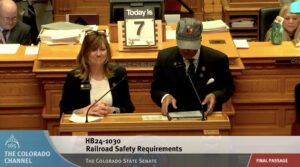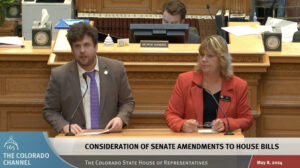Colorado senators gutted most provisions of a wide-ranging railroad-safety bill before giving it final approval this week, choosing to create a new Office of Railroad Safety rather than a list of regulations that critics warned would be pre-empted by federal industry rules.
House Bill 1030, sponsored by Democratic Reps. Javier Mabrey of Denver and Tisha Mauro of Pueblo, traveled what Mabrey described on the final day of the 2024 legislative session Wednesday as “quite a journey.” He acknowledged he had to give up most of the originally proposed changes but said Colorado instead will get a new agency charged with examining the issues that he had sought to regulate and will understand better how it can reduce train derailments and spills.
Opponents, most of whom were Republicans siding with railroads, breathed a sigh of relief at the final structure of HB 1030 but still voted “no,” arguing the reporting the bill requires and the high potential fines for violations of one section are an example of state overreach. Proponents — mostly Democrats siding with railroad worker unions — said they believe that establishing an office to collect data that can address rail safety issues will benefit rail passengers, rail workers and the communities that surround rail lines.
“Train derailments can shut down critical transportation networks, cause major environmental harms and threaten the health and safety of countless individuals,” cosponsoring Sen. Tony Exum, D-Colorado Springs, said in a statement. “This bill will help ensure that the economic needs of our commercial rail system are met, without sacrificing the safety of our communities, our environment or our transportation officials.”

Colorado state Sen. Tony Exum describes his railroad safety bill next to Sen. Lisa Cutter after a fellow senator placed a railroad engineers’ cap on his head.
Why legislators are eying railroads
Rail systems, once the lifeblood of Western settlement, continue to be a vital artery for transporting goods, and they are grabbing more attention too as people-moving systems, particularly as Gov. Jared Polis seeks to construction a Front Range Passenger Rail system. But high-profile accidents, such as a fatal October derailment in Pueblo, have raised red flags, particularly among union workers, over whether there is enough oversight of the increasingly longer trains that sometimes carry hazardous materials.
HB 1030, which came out of the interim Transportation Legislation Review Committee, had a long list of fixes it intended to make. It would have limited train lengths to 7,500 feet, required installation of wayside detector systems every 10 miles, mandated new insurance requirements for trains moving hazardous materials, required railroads to clear blocked crossings within 10 minutes and allowed union representatives onto railroad property to inspect trains in accidents.
From the start, railroad representatives told bill sponsors that almost everything they intended to do was pre-empted by federal law on the interstate industry. A few requirements disappeared in the House, but most remained until an April 17 Senate Transportation & Energy Committee hearing after which Exum and cosponsoring Sen. Lisa Cutter, D-Morrison, asked for time to make changes to the bill.
Sponsors tack major amendments onto bill
Nine days later, they passed an amendment that eliminated the train-length limit, removed the new insurance requirements and limited union representatives’ free access to accident sites, while creating the new rail-safety office in the Public Utilities Commission. Then on Monday — the 118th day of the 120-day legislative session — they yanked the wayside-detector mandates, eliminated all requirements regarding blocked crossings and specified that union representatives just will be allowed to file complaints with the rail-safety office.
As HB 1030 now stands, it requires railroads to submit to the PUC a report on their spacing of wayside detectors — electronic devices that monitor whether passing trains have hot bearings or dragging equipment — and to report accidents within 30 minutes. It also states that the state “expects” operators to minimize obstruction of highway-rail crossings, and it states that emergency vehicles stuck at blocked crossings shall request that railroads immediately take action to clear those areas.

Colorado state Reps. Javier Mabrey and Tisha Mauro ask House members to concur with Senate amendments on their railroad safety bill.
The bill still contains fines that can range from $10,000 to $100,000 for railroads that fail to submit wayside-detector reports or violate the blocked-crossing protocol, with the money going to the transit and rail division. And it asks the newly constituted rail-safety office to submit to the Legislature later this year a report with information on increasing rail safety — including assessments of train length, financial responsibility for cleanup of hazardous materials and necessary staffing levels.
“Hazardous materials are frequently moved by rail through heavily forested areas near critical waterways, so an accident so an accident has the potential to be catastrophic,” Cutter said in a news release.
Republicans still object to railroad safety bill
Sen. Kevin Van Winkle, R-Highlands Ranch, said the most offensive sections remaining in the bill are in the legislative declaration of why it is needed, including a paragraph stating that derailments involving hazardous materials began going up after railroads “implemented precision scheduling to increase profits.” He called the statements “very disrespectful” of railroads and said they amount to nothing more than “cheap shots.”
Meanwhile, Senate Minority Leader Paul Lundeen, R-Monument, said that even with the removal of most regulations, he does not see a need to create a new rail-safety office.
“The marketplaces are more motivated to get to safety than policy makers could ever be, because the people who run these trains lose money every time they have an accident,” Lundeen said during Senate debate on Monday. “We are desperately in need of them to function well. But you know who is more in need of them to function than us, the consumers? It’s the railroads.”
Mabrey said Wednesday as he sought concurrence on the Senate amendments that he was frustrated with how many objections the railroads brought up after the bill reached the Senate. But he also said the state will benefit from the new office, a new rail-safety commission created in the bill and the whistleblower protections granted to rail workers.
